Originally published on Open Democracy.
Since the death of president Islam Karimov in 2016 and his replacement by Shavkat Mirziyoyev, Uzbekistan’s new government has embarked on a highly public path of economic and political reform. It is, in effect, an attempt to curtail the rampant state corruption that emerged under Karimov’s brutal 27-year rule.
In Uzbekistan, companies have traditionally enjoyed privileges – or relative freedom from extortion – on the basis of the owners’ political reach. While all businesses are ostensibly equal before the market, the invisible (or opaque) hand of the Uzbekistani state has ensured some are more equal than others.
This backstory could have foreboding implications as President Shavkat Mirziyoyev, Karimov’s successor, sets a new entrepreneurial tone to life in this Central Asian state.
The Mirziyoyev government is currently instigating a rapid programme of privatisation and deregulation, pump-primed by international financial institutions.
Through a raft of official decrees, core sectors in the Uzbek economy are being privatised, and businesses are being granted tax holidays, customs exemptions, zero-cost sale of public assets, subsidised loans and certain monopoly rights. There is little transparency on the criteria, deliberations, or processes used to award these significant privileges.
To compound matters, limited liability companies in Uzbekistan operate with minimal public reporting requirements and little regulatory oversight, using offshore jurisdictions for extra insulation.
Tashkent, the country’s capital, has been chosen as the prime location for the Mirziyoyev regime’s experiment – and Jahongir Artikhodjaev, the city’s Mayor, is overseeing it.
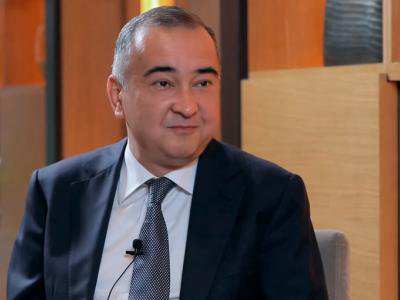
Image: Jahongir Artikhodjaev
Jahongir Artikhodjayev and the business empire he founded are the epitome of Mirziyoyev’s vision for Uzbekistan – open for business, enterprising and internationally oriented.
This is why the editors of Power Briefs | Central Asia, a new reporting series that draws on data science and open source investigative techniques, chose to focus on Artikhodjayev for their first issue. The following article is based exclusively on this research.
To the top
Jahongir Artikhodjayev, the man behind the vast business empire operating through the Akfa and Artel groups, has enjoyed a rapid political ascendancy under Mirziyoyev. In tandem with Artikhodjayev’s political ascendency, the Akfa-Artel group has gone from strength to strength, with notable assistance from the Uzbek state.
Behind this business empire is a sizeable transnational legal structure made up of limited liability companies, limited liability partnerships and Scottish limited partnerships. This network is extremely opaque, making it impossible to determine beneficial ownership or potential political exposure.
During the Power Briefs investigation in February-March 2019, data was extracted from a wide range of open data and business portals, tabulated and cross-matched. This data allowed forensic examination of the structures and laws underpinning a number of recent successes for the Akfa-Artel group. It revealed a series of dilemmas that are at the core of challenge faced by the Mirziyoyev government if it is to live up to the generous praise it has received.
These problems concern serious conflicts of interest and a significant lack of transparency, which, according to the OECD, are enduring blind-spots in Uzbekistan’s anti-corruption reforms.
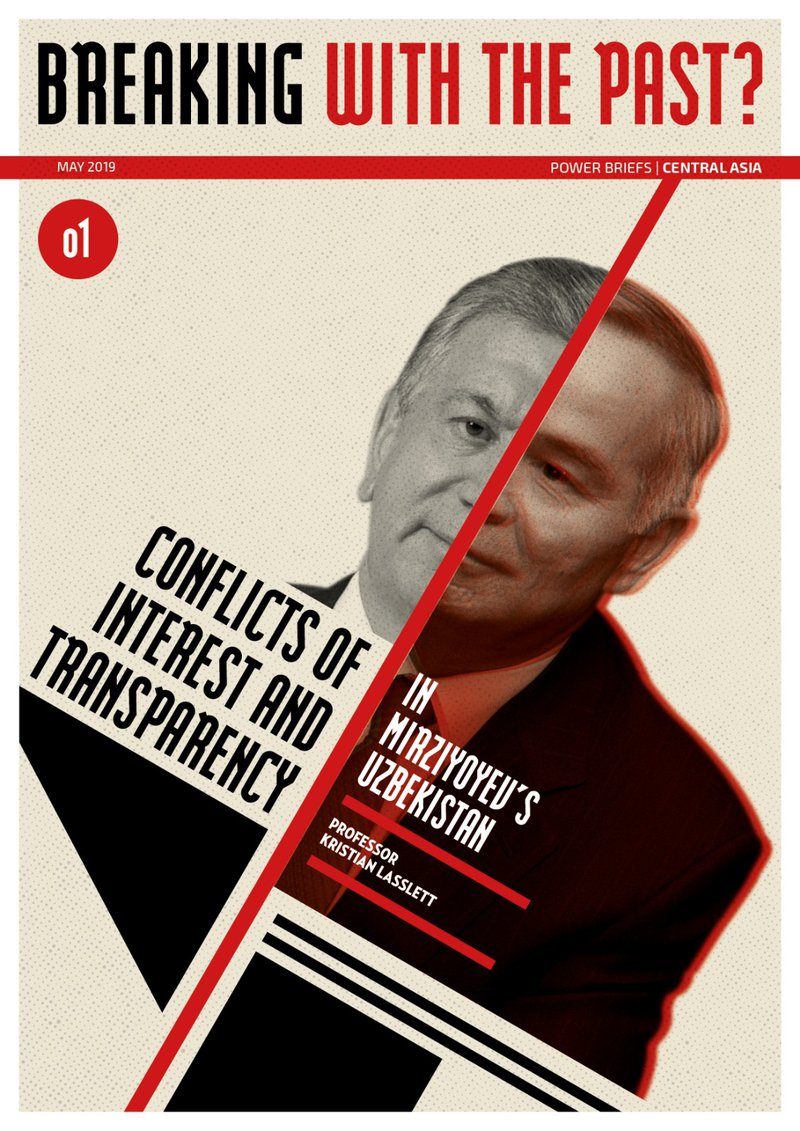
“Conflicts of interests and transparency in Mirziyoyev’s Uzbekistan” | Power Briefs
On numerous occasions it was discovered that Mayor Artikhodjayev had authority over public-private initiatives in which either he, his wife, or business partners had a private interest. These projects included significant state aid. It appears that no conflict of interest was declared in the cases reported here.
These public-private deals were struck outside of an open, competitive tender process. It was difficult to get even basic information despite admirable freedom of information laws in Uzbekistan.
But it is not all bad news. There were welcome examples of public agencies and private sector actors taking on tough questions in the spirit of engagement, when correspondence was sent in April 2019 to all key stakeholders featuring in the investigation results.
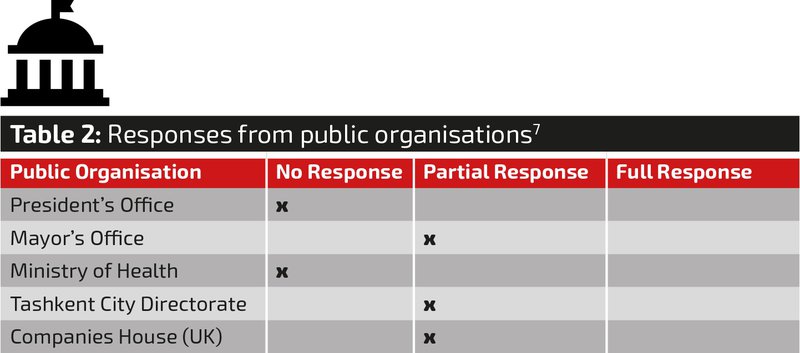
Responses from Uzbek public organisations | Power Briefs
Priming this process of engagement is a growing preparedness of the Uzbekistani state to invest in open government resources, which contributes to a more robust evidence base upon which difficult conversations can take place.
These are important gains and should be applauded, without faltering from taking on the hard issues head on.
The focus here will be on certain dilemmas emerging from Tashkent’s construct boom and the government’s steps to privatise health care provision, both of which Akfa-Artel have a significant stake in.
The conflict behind Tashkent’s construction boom
Over the past two years, the mammoth property redevelopment of Tashkent city centre has generated significant concern from residents, academics and civil society. One development in particular has stood out owing to its size and the controversy generated – Tashkent City.

Concept art for Lot 1, Tashkent City | Source: Tashkent City
With an anticipated price-tag of US$1.3 billion, the Tashkent City project is likely the biggest state-sponsored luxury property development in Uzbekistan’s history. Situated over 80 hectares in the heart of Tashkent, the project is strongly championed by President Mirziyoyev and his government through a special public directorate. This directorate has been responsible for securing investors and project managing the property development through to completion.
Civil society, including a number of openDemocracy investigations, has uncovered evidence of questionable foreign investors, a lack of public transparency, and serious rights violations of residents displaced by the project, all of which has dented the Mirziyoyev government’s reform credentials.
Jahongir Artikhodjayev, in particular, has been at the centre of Tashkent City and the subsequent controversy. In 2017, Artikhodjayev was appointed to head the public directorate responsible for the project, and then in 2018 he was appointed Mayor of Tashkent.
In a previous article for openDemocracy, I raised serious questions over the Mayor’s public role and the private interest held in the Tashkent City public-private initiative through companies and individuals connected to the Akfa-Artel groups.
Using new data collection and analysis techniques, these concerns have only heightened since.
For example, there are eight proposed lots that make up the Tashkent City development. General contracts awarded to manage the construction of lots 1, 5, 7 and 8 went to Discover Invest LLC, according to information published on the project website in 2018 – some of which has since been removed.
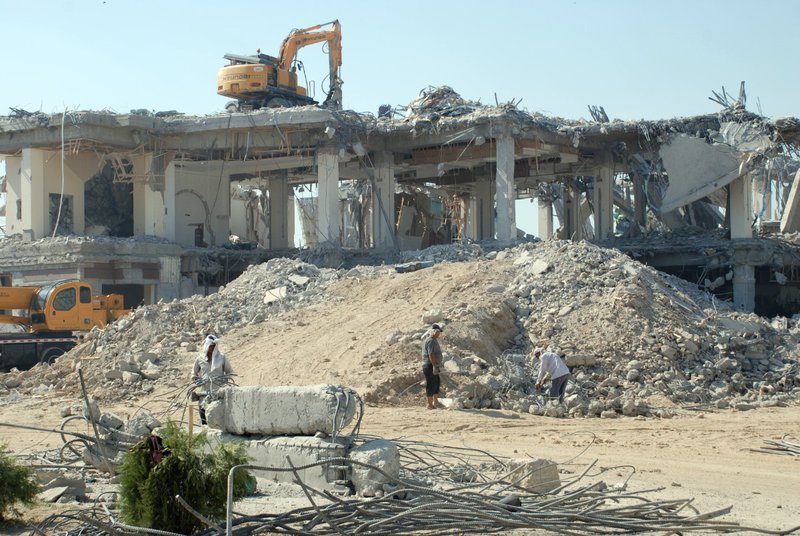
The redevelopment of Tashkent | Source: Atkhan Akhmedov
According to data from the government’s business register examined during March 2019, 86.18% of Discover Invest LLC’s stock legally belongs to Abror Ganiyev.
That same month, Abror Ganiyev was appointed Chair of the Akfa group.
Corporate data held in Uzbekistan’s official business register also revealed that Abror Ganiyev jointly owns four companies with Jahongir Artikhodjayev. Additionally, it suggested Ganiyev co-owns at least three companies in the Akfa-Artel group.
The registered address of Discover Invest is the same as J-United Group, a company 100% owned by the Tashkent Mayor. J-United is a key holding vehicle used by Artikhodjayev for his business interests in Uzbekistan.
To use another example: the investor in Lot 1 of Tashkent City, described by the Directorate as a foreign investor, is High Land City LLC.
According to Uzbekistan’s business register, this company’s largest shareholder is Ismail Israilov, with a 81.24% share in the firm.
Israilov is listed in the business register as manager for Akfa Engineering and Management, a company 100% owned by Artikhodjayev according to March 2019 investigations.
These investigations also revealed that Israilov co-owns at least four companies with Jahongir Artikhodjayev. He is also the sole stockholder in six companies linked to the Akfa-Artel group, and co-owns at least four companies with Abror Ganiyev.
Data on Uzbekistan’s business register indicates foreign investors only have a minority share in High Land City LLC. The “foreign” minority stakeholders include Techno Continental (8.19%) and Next Generation Product (8.17%), both companies are owned through opaque offshore vehicle.
For example, Techno Continental is 100% owned by Wynex Innovation LLP, an English Limited Liability Partnership which was reported in 2015 to be in a US$2 million joint venture with Infinity Electronics, which produces consumer electronics under the Artel brand.
The stock of High Land’s other minority shareholder, Next Generation Product, is owned by an offshore vehicle from the UK and an offshore vehicle from Singapore. Next Generation Product’s registered email address is @artelgroup.org.
None of the three offshore entities have to declare beneficial owners. Therefore, it was impossible to determine who owned these companies.
Israilov has other corporate interests in Tashkent City. A concrete concern, Durable Beton LLC, boasts that although in business for less than a year, it has supplied concrete to numerous state sponsored property developments. Tashkent City is given prominence in the company’s promotional material.
When Durable Beton LLC’s record was checked on the business register in March 2019, its shares were held 100% by Ismail Israilov.
News report on Tashkent City
If we turn to Tashkent City Lot 5, we see a more straight-forward link to the Akfa-Artel group. The investor in this Tashkent City lot, which includes a Hilton-branded luxury hotel, is Akfa Dream World.
Unfortunately to access the company’s business register profile, a tax identification number is required. This places a significant restriction on the public’s ability to consult the register for basic details on companies operating in Uzbekistan. In some cases it is possible to acquire the tax identification number from open source registries. A request for the number sent to the Akfa group was not responded to.
However, corporate filings by one publicly listed joint stock company indicates that Perfect Plast Profil has a 20.4% stake in Akfa Dream World.
Perfect Plast Profil’s shares the same registered address as Techno Profil, a company 100% owned by Jahongir Artikhodjayev.
Perfect Plast Profil’s stock, however, is owned by Esperansa Group LP, a Scottish Limited Partnership registered on 13 April 2016.
Under recent transparency reforms, Scottish Limited Partnerships must declare persons or entities with significant control (PSC) (a PSC has a 25% or greater stake or voting rights in the entity). Esperansa Group LP has declared one PSC, Esperansa Incorporated LP, an English Limited Partnership registered on 6 October 2017.
Limited Partnerships in England do not need to declare PSCs. Under the transparency reforms, it is unlawful to declare opaque forms such as this a PSC.
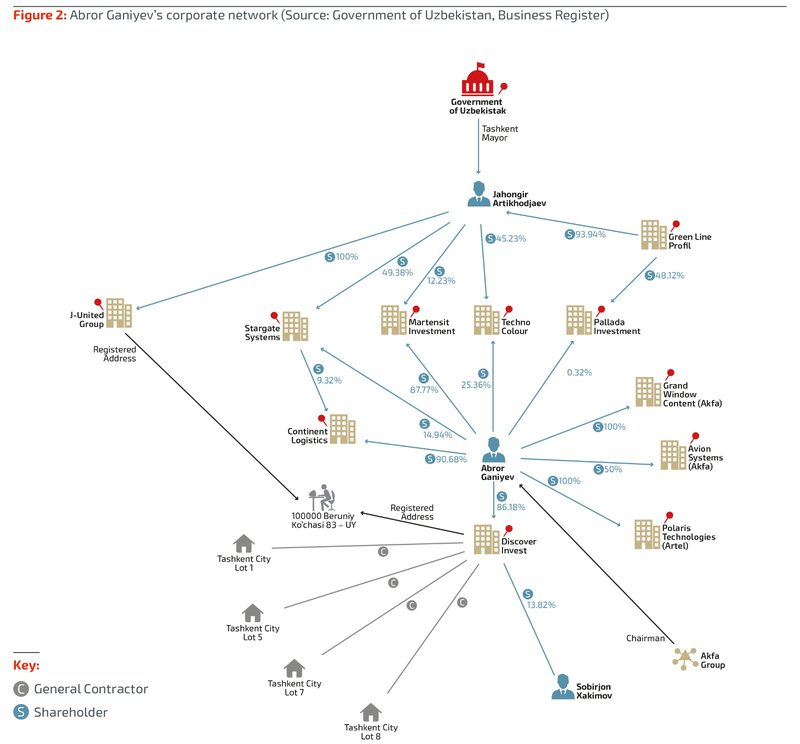
Abror Ganieyev’s corporate network | Power Briefs
Finally, there is the example of Premium Village LLC, which has been selected as an investor in Lot 7. Premium Village LLC shares a registered address with Artel Engineering and Management LLC, which during the March 2019 investigation was majority owned by Jahongir Artikhodjayev (80.88%).
Premium Village’s shareholders include Ismail Israilov (23.28%), in addition to Quality Electronics (37.20%), Asia Electron (28.51%), and Factory of Technologies (9.30%). Factory of Technologies and Quality Electronics registered email address is @artelgroup.org, while Asia Electron’s gmail account is the same used by Dream Production, a company owned by the Mayor, Jahongir Artikhodjayev.
Quality Electronics, Asia Electron and Factory of Technologies are 50% owned by MacMerry Management LP, the other 50% in Quality Electronics and Asia Electron is held by the Singaporean firm, Commerce Standard Pte Ltd. The remaining 50% in Factory of Technologies is owned by Singapore Syndicate Group International Pte Ltd.
MacMerry Management LP and the Singapore Syndicate Group were also part of the ownership structure for High Land City LLC, the investor in Lot 1.
Macmerry Management, Singapore Syndicate Group, and Commerce Standard, are all part of the Akfa-Artel group’s offshore ownership structure.
Because there is no comprehensive public register of beneficial owners in the UK or Singapore, it is impossible to identify the beneficiaries standing behind these offshore entities.
We, therefore, find with three key investors in Tashkent City, certain transparency dead ends.In the case of High Land City and Premium Village we also find a major shareholder who is a business partner of the Mayor, and a manager in one of his companies.
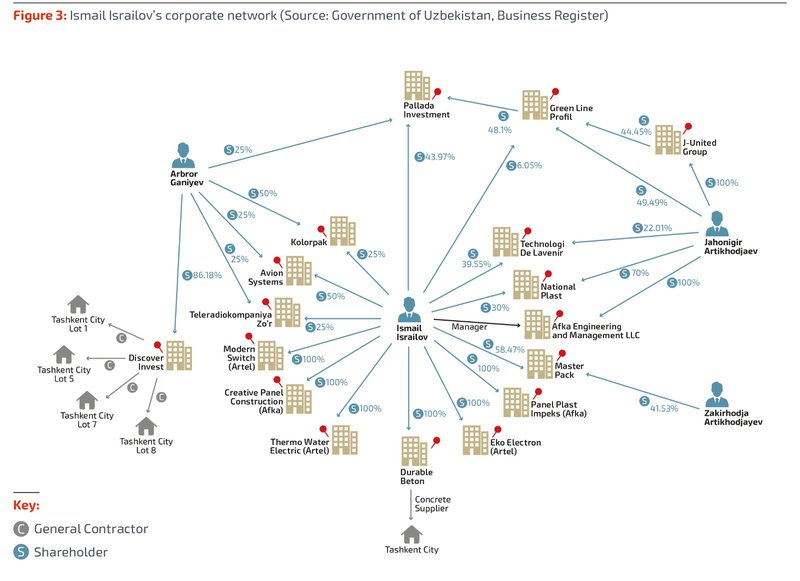
Ismail Isarilov’s corporate network | Power Briefs
The Mayor of Tashkent’s office has confirmed that investors were selected by a special Administrative Council. Our attempts to access documents that would give an insight into the criteria and selection process employed were denied.
The Tashkent City Directorate claims general contractors and suppliers are selected by investors. No further information could be provided.
Owing to the closed nature of selection and procurement procedure, it is impossible to determine whether these processes have been impacted by improper influences.
From national park to dolphinarium
A prelude to Tashkent City can be found in the state-led redevelopment of Navoi National Park redevelopment, a sizeable green space in Uzbekistan’s capital.
Named after Uzbek artist and intellectual Alisher Navoi, this park is one of Tashkent’s most celebrated open spaces. In 2015, it was designated Central Asia’s first eco park in 2015 by the UN office in Uzbekistan.
However, work is underway to convert parts of Navoi National Park into an upscale recreation hub, which will include an amphitheatre, a shopping and entertainment centre, an amusement park, and dolphinarium.
The estimated cost of the redevelopment is US$60 million, staggered over three years ending in 2020. It is a state-sponsored project, implemented through Cabinet of Ministers regulation passed on 4 September 2017.
The Mayor of Tashkent is again charged with oversight of the project.
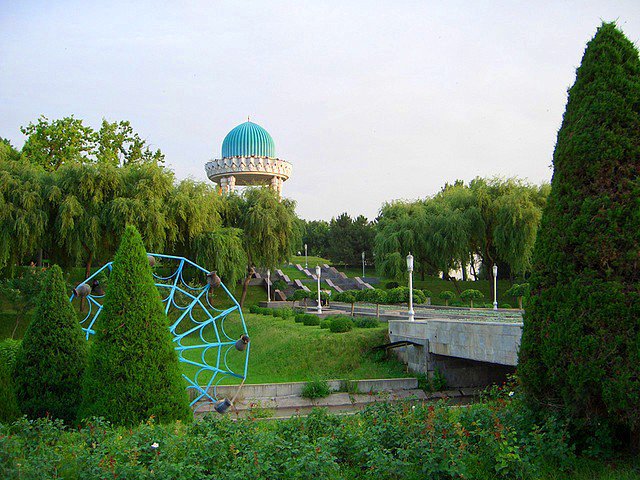
Alisher Navoi National Park | Source: Visit Uzbekistan
But examination of Uzbekistan’s business register reveals that the company leading this redevelopment, Stargate Systems LLC, was registered on 7 August 2017, roughly one month before the Cabinet’s regulation was passed.
Stargate Systems’ shares are held by Jahongir Artikhodjaev (49.38%), Abror Ganiyev (14.94%), and Preston Impex LP (35.68%). Preston Impex LP is a Scottish Limited Partnership registered on 25 January 2017. Little is known about this SLP, except that the partnership had a starting capital of £100.
Stargate Systems LLC has been issued with a 49-year lease on the 20.79 hectare national park, in return for a proposed US$60 million investment. According to the Cabinet decree, the company has also been granted customs exemptions and, quite exceptionally, permission to build the project before submitting requisite design documentation. The plot, as well as buildings and equipment, will transfer back to the state at the end of the lease.
There was no public tender for this project.
Kamola Mirzaaliyeva, finance director at Akfa group – which is responsible for managing the Navoi park project, stated in 2017: “We took our concept to the city administration and the culture department, outlining the amount of investments, all the stages. The project was studied and approved.”
Public concern has been sparked by the project’s potential environmental impact on the Eco Park, a concern dismissed by Akfa.
It is also a project that Jahongir Artikhodjayev must once again report to his superior once he assumed the position Mayor of Tashkent, under the country’s conflict of interest laws.
The Mayor’s office claims that Artikhodjayev does not have a private interest to declare, a statement that contradicts the records provided via Uzbekistan’s official business register.
This contentious marriage between public and private interest ordained through opaque administrative processes is echoed elsewhere in Akfa-Artel group, notably its growing stake in private health care provision.
The privatisation of healthcare in Uzbekistan
The private health sector in Uzbekistan has much to cheer about.
Since succeeding Islam Karimov in 2016, the Mirziyoyev government has championed a rapid privatisation of healthcare provision, which lies at the core of the national health strategy.
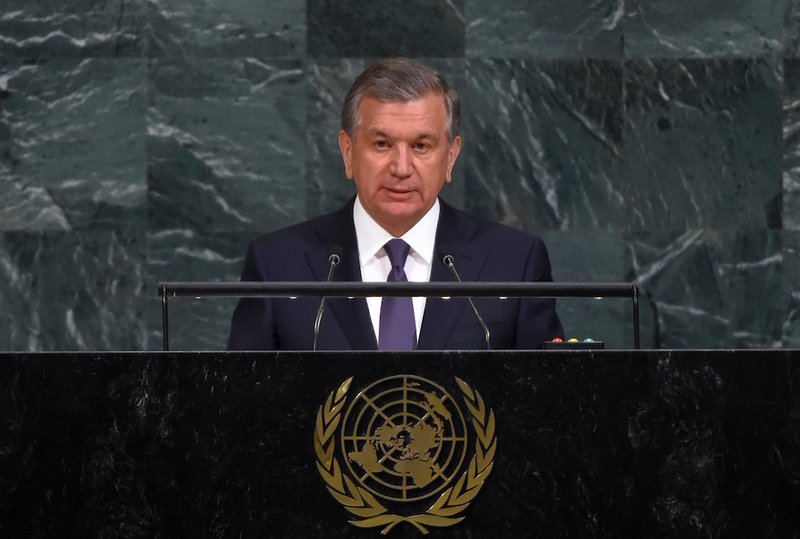
Shavkat Mirziyoyev | Source: President of Uzbekistan
A special state commission has been charged with responsibility for making this so.
Tax exemptions, customs privileges, zero-cost awards of infrastructure and land, subsidised loans, and a rapid increase in demand through a compulsory private insurance scheme, are just some of the tools being used to pump-prime the sector.
This policy, in effect, will compel the public to become consumers of private medical services that are being subsidised by the state, as the Mirziyoyev government attempts to shift health care onto a private footing.
One company is in prime position to reap the benefits of this state supplied jolt to the sector: Akfa Medline.
Akfa Medline is the only private company selected to sit on the commission set up in December 2018, which is primarily made up of government ministers and senior civil servants. The commission will draft measures that will see Uzbekistan’s healthcare industry rapidly accelerate. This gives Akfa an unrivalled opportunity to help design the rules of the game for their industry.
Akfa Medline’s representative on the Committee is Kamolat Mirzaliyeva. She is listed as both a shareholder (38.36%) and a manager at Akfa Medline. Mirzaliyeva was also cited above as the spokesperson for Akfa overseeing the Navoi National Park redevelopment.
Why Akfa has been singled out for preferential treatment by the government in the healthcare arena is not clear. Uzbekistan’s Ministry of Health did not respond to our questions.
Nor is this the only example of Akfa Medline gaining advantage by entering the government slipstream.
Under a recent Cabinet of Ministers regulation dated 15 February 2019, Akfa Medline was awarded the use of Shaykhantakhur Medical College in Tashkent at zero-cost. The company will transform the site into a new private university specializing in medicine. In addition to a free campus for its university, Akfa Medline has been granted tax holidays and customs exemptions.
There was no public tender for this project. Like with the Navoi National Park redevelopment, it was secured at the initiative of the Akfa group, and negotiated privately with government.
Akfa Medline confirmed via email: “Based on the results of the study of consumer demand and the high demand for highly qualified medical personnel, Akfa Medline launched an initiative to create a modern University. The Ministry of Health supported this initiative.”
Tashkent’s mayoral administration, headed by Jahongir Artikhodjaev, has been charged with responsibility for helping to oversee the College’s redevelopment for Akfa University.
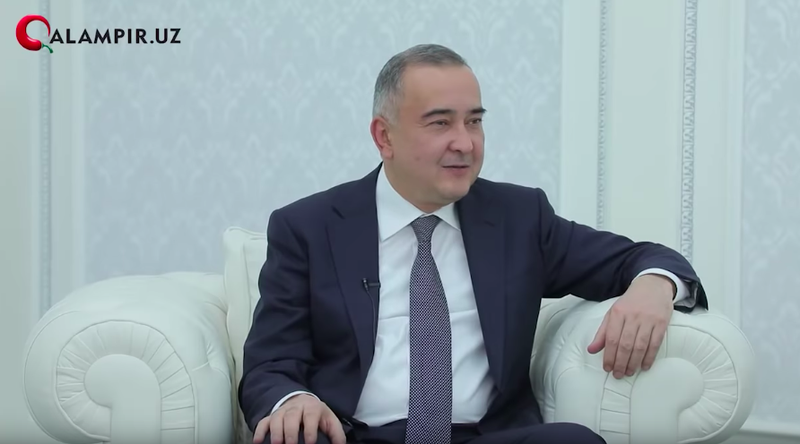
Jahongir Artikhodjaev | Source: Qalampir / YouTube
Company extracts show Akfa Medline is majority owned by “Artikxodjayeva Nigoraxon Baxromxo‘ja” (61.60%), while a minority stake is held by “Mirzaliyeva Kamolat Kukanbayevna” (38.40%).
Nigoraxon Baxromxo‘ja Artikxodjeyeva is the wife of the Tashkent Mayor.
The Mayor’s office confirmed this fact, and has stated it does not constitute a conflict of interest, arguing that, under the Cabinet of Ministers regulation establishing Akfa University, responsibility for the project lies with Uzbekistan’s Deputy Prime Minister and Minister for Health.
The governing regulations, however, apportions some responsibility for the project to Tashkent’s city administration. Article 10 states the city administration is charged with assisting Akfa university prepare design documentation for reconstructing the university’s buildings and dormitories, as well as equipping it with teaching and laboratory equipment before the beginning of the 2019-2020 academic year.
Actioning Uzbekistan’s anti-corruption law
This investigation has found some admirable examples of open government, and preparedness on the part of select officials and companies to engage with difficult questions. Disappointingly this does not include the President’s office or the Ministry of Health.
There is also a growing number of laws, regulation and decrees in Uzbekistan that, in theory, deliver on a commitment to rigorous anti-corruption reforms.
Uzbekistan’s 2016 ethical rules for government employees, which foreshadow provisions in the country’s 2017 Anti-Corruption Law, state that a conflict of interest arises “in a situation where public servants have a personal interest, which affects or may affect the objective and impartial performance of their duties.” This includes “obtaining any benefit or advantage for them personally or for their close relatives, as well as other persons with whom they have close or business relationships.”
Where such conflicts exist, they must be reported to the public official’s supervisor, and appropriate action taken to manage the conflict. Unfortunately, Uzbekistan’s laws are vague on the consequences when these requirements are breached.
After we conducted this investigation, we wrote to the Mayor, his office and the Akfa-Artel group during April 2019 about these concerns. The Mayor’s office, in a detailed response to this investigation, claimed there is no conflict of interest to report. But in the weeks after, the Mayor’s stockholdings in the Akfa-Artel group are now being transferred to his wife, managers in the group, and other existing stockholders.
In most instances, transferring stock would not avoid conflict of interest rules coming into effect – the law includes family members and business partners. It also clearly would not have retrospective effect: many of these private-public initiatives were undertaken in 2017 and 2018, while Jahongir Artikhodjayev was head of the Tashkent City project, and then mayor of Tashkent.
This investigation is testament to the fact that significant state aid continues to be supplied on the basis of opaque decisions, in a market environment where an absence of substantive corporate disclosure means ownership structures are cloaked in secrecy.
Freedom of information laws in practice are not being upheld. Even basic information on the criteria and procedures involved in significant economic decisions are difficult to obtain.
This is deeply problematic when open and competitive tender processes are being circumvented on big ticket projects.
And it appears that even the more progressive elements within the Mirziyoyev government have a limited interpretation of anti-corruption requirements in key areas such as conflict of interest – with little consequence in law for failing to conform.
As the country undergoes an increasingly rapid process of privatisation and market reform, this lack of oversight heightens the risk that shadowy deals will continue to determine who wins and who loses in the new Uzbekistan.
Read the new Power Briefs report here in full.